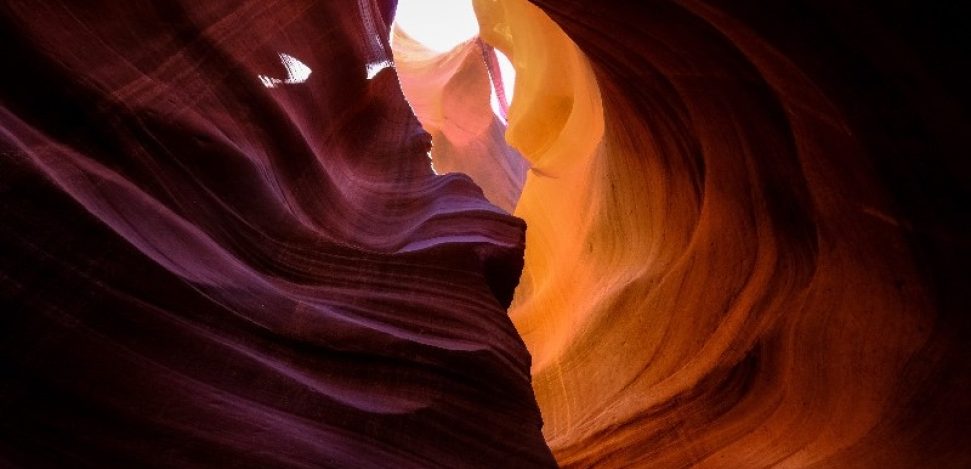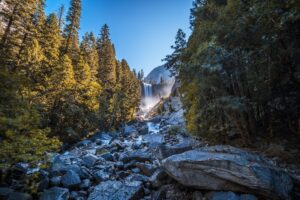The Valley of Fire boasts some of the most incredible natural landscapes in the entire United States. Moreover, it’s so close to Las Vegas that it’s worth a visit if you’re passing through this city.
The Valley of Fire State Park is a National Natural Landmark and Nevada’s first state park, established in 1934. However, its stone structures have millions of years behind them. You’ll see it with your own eyes when the afternoon sun illuminates the red sandstone!
WHERE IS VALLEY OF FIRE?
Visiting Valley of Fire from Las Vegas is a great idea if you’re going to be in the area for a few days or just passing through. This state park, located in Nevada, is less than an hour away from Las Vegas, making it an easy trip.
BEST TIME TO VISIT VALLEY OF FIRE
Given that it’s in the Mojave Desert, the weather in Valley of Fire remains warm and dry throughout the year. Regardless of when you go, try to arrive at the park early in the day when temperatures are still somewhat cool.
The best time to visit Valley of Fire is from mid-fall to mid-spring (October-April). This way, you can avoid the extreme summer heat, which can easily reach 38 °C. That said, winters are mild here, with temperatures ranging from 10 to 20 degrees Celsius.
OPENING HOURS AND ADMISSION PRICES FOR VALLEY OF FIRE
The entrance fee is $15 per vehicle ($10 for Nevada residents). If you want to camp in Valley of Fire, the price is $25 per night per vehicle ($20 for Nevada residents).
Once you enter the park, we recommend stopping by the Valley of Fire Visitor Center, which is open every day from 9:00 AM to 4:00 PM. There, you’ll find trail maps, information about routes, and exhibits about the park’s geology and history!
DO YOU KNOW HOW BIG IS YELLOWSTONE NATIONAL PARK?
Other TOP TIPS
-
With so much to do in Valley of Fire, plan your itinerary to make the most of your time.
-
Make the Visitor Center your first stop to pick up trail maps and hiking guides for Valley of Fire.
-
Arrive early to beat the heat and don’t forget sunscreen.
-
Be prepared for Valley of Fire’s weather with loose, light-colored clothing, sunglasses, and a hat or cap. Closed-toe shoes are best for walking on sandy terrain.
-
Bring plenty of water and some snacks.
-
Consider booking a tour of Valley of Fire if you don’t want to drive or don’t have a car.
-
Leave no trace. Pick up your trash, don’t litter, and leave the area as you found it.
-
Don’t feed the animals you encounter, but have your camera ready to capture wildlife sightings.
We also have a Valley of Fire map for you. Having it handy will make it easy for you to locate all the attractions you plan to see!
NAPA VALLEY: BEST THINGS TO DO 😉
11 MUST-SEE SIGHTS IN VALLEY OF FIRE STATE PARK
Valley of Fire State Park has something to offer to all visitors, including trails for all levels, a scenic drive, wildlife, and impressive geological wonders. Here are the most important ones.
1. FIRE WAVE
The Fire Wave in Valley of Fire is an absolute must-see. This massive sandstone formation is renowned for its striking red and white veins. And let us tell you, the journey to reach it is truly something special. While viewing pictures of this striped marvel is impressive, standing in its presence is an entirely different experience.
As you venture towards the Fire Wave, you’ll encounter colorful cliffs and vibrant sandstone mounds, offering just a glimpse of the breathtaking scenery ahead, with its expansive landscape adorned with red, pink, and orange stripes!
Descending through this area sculpted by time, you’ll find yourself in awe of the picturesque natural stone formations. Be sure to explore the western end of the wave, where the stripes are most striking!
To reach this natural wonder, you’ll need to hike along the Fire Wave Trail, one of the most popular routes in Valley of Fire.
2. MOUSE’S TANK
Mouse’s Tank in Valley of Fire, Las Vegas, is another stop you want to add to your list. This natural basin got its name from a Paiute Indian nicknamed Mouse, who used it as a water hole while hiding in the area after being declared an outlaw in the 1890s.
Also, there’s the Mouse’s Tank Trail, an 800-meter loop trail filled with petroglyphs. As you head to the basin, you’ll pass by several impressive rock walls adorned with prehistoric art.
These ancient symbols reflect the way of life of the early Native Americans and depict people and animals. Though the trail may seem short, we encourage you to take some time to admire the petroglyphs. Just remember to treat these ancient rock carvings with care – they’re thousands of years old!
3. RAINBOW VISTA
It’s a landscape of canyons, domes, towers, and valleys, with geological structures carved millions of years ago.
Plus, the scenic trail to Rainbow Vista is considered one of the best routes in Valley of Fire. It’s just over a mile long and leads to a viewpoint where you can take in the vastness of the canyons. It’s undeniably a unique area. The colorful spectrum contrasts with the park’s defining red sandstone!
DISCOVER THE NEWEST NATIONAL PARKS IN THE US!
4. PINK CANYON
Pink Canyon might not be marked on most Valley of Fire maps, but that doesn’t mean you should overlook it. This pastel-colored canyon is near the Fire Wave, so you won’t have to go out of your way to see it.
Also known as Pastel Canyon, this area is characterized by its ‘rosy’ and pastel tones in orange, yellow, and white. You can reach here via the Mouse’s Tank Road. The start of this narrow trail is between the Fire Canyon Road and the Fire Wave parking lot.
Walking among the gentle canyon walls will make you feel like you’re traveling to another world. The carved sandstone creates intriguing shapes that resemble abstract sculptures or maybe even melted ice cream. Again, we’ll emphasize that the Pastel Canyon trail isn’t marked, so it’s best to backtrack to avoid getting lost.
5. ARCH ROCK
It’s a worthwhile stop you can make while driving along the 3-kilometer Scenic Loop Road.
Millions of years of torrential rains and strong winds created this natural arch, which will eventually collapse due to natural forces. That said, for now, you can still admire this delicate arch. You can even walk around it.
Visiting this sandstone formation is one of the best things to do in Valley of Fire, Nevada, especially if you’re with kids who aren’t up for much walking. Arch Rock is best viewed from the Valley of Fire Scenic Drive Loop. Along this route, you’ll also come across Piano Rock, another interesting structure that resembles a grand piano!
LEARN MORE ABOUT THE NORTHERN LIGHTS OF ALASKA!
6. ATLATL ROCK
If you want to see petroglyphs in Valley of Fire, another area to visit is Atlatl Rock. It’s easy to spot this large rock as it’s on the west side of the Scenic Drive Loop. That said, we recommend you stop here to get a closer look at the ancient rock art of the Native Americans.
These 4000-year-old petroglyphs depict animals and people. Upon closer inspection, you’ll see that the figures are hurling spears with atlatls (thin cords that give spears more force and rotation).
Having Atlatl Rock right off the Scenic Loop means you won’t have to walk far to get there. A metal staircase leads directly to the petroglyphs on the rock’s side. It’s about 15 meters high and very stable!
This area also features some picnic tables, a trail, and the Atlatl Rock campground, making it perfect if you want to spend some time exploring.
7. ELEPHANT ROCK
One of the unique geological structures in the Valley of Fire is Elephant Rock. As the name suggests, this massive rock formation resembles an elephant with a rigid stone trunk. It’s worth a visit, and you won’t miss it if you enter the park from the east – it’ll be the first thing you see. Plus, it gives you access to the Elephant Rock Trail, an easy loop that you will enjoy.
Walking around the structure, you’ll be amazed at how much it resembles a natural elephant. You’ll notice that it’s made up of various rocks and columns, giving it an animal-like shape. It’s no wonder it’s one of the best formations to see in Valley of Fire. Just be careful not to climb the formation as it’s quite fragile!}
Ver esta publicación en InstagramUna publicación compartida de Valley of Fire state Park (@valleyoffirestatepark)
8. THE BEEHIVES
Just across from Atlatl Rock, you’ll find another popular sight in Valley of Fire State Park: The Beehives. Yes, these geological formations do look like beehives, so you’ll want to snap some photos.
Aside from being an impressive attraction, the sandstone beehives serve as an opportunity to learn about the park’s geology. They’re an excellent example of cross-bedding, where several layers of rocks are arranged in different directions. You can even determine the direction of the wind based on the angle of each layer.
The path to the beehives is short, so you won’t have any trouble finding this unique formation.
9. WHITE DOMES
The White Domes area is one of the most beautiful structures to see in Valley of Fire, so we highly recommend checking it out. To get there, take the White Domes Trail, a little over a kilometer route through an impressive and narrow canyon.
As you walk, you’ll see how the striped walls alternate between orange, yellow, and white. The further you go, the more varied the landscape becomes, transitioning between slot canyons, desert, large sandstone formations, and panoramic views.
The trail leads you through striated rocks, natural arches, and amphitheaters, making it one of the most popular routes in Valley of Fire. Here, you’ll even see the remains of an old 1960s film set.
10. FIRE CAVE
Like many other geological structures in the park, Fire Cave is a wonderful work of nature. Created by years of erosion, it’s one of the most beautiful formations in the Valley of Fire. It may be small, but don’t let the size deceive you.
One of the most interesting aspects of this cave was the Windstone Arch, a slender natural arch that leaned above. Unfortunately, it collapsed. Since then, you can only see the cave. Still, we think it’s worth a visit!
When the desert sun sets on the pink rocks of Fire Cave, they seem to glow. You can carefully enter the cave to escape the sun. Although small, the interior walls feature some incredible patterns. The organic textures contrast with the walls of red, orange, and pink stripes, creating one of the most fascinating scenes in the park.
11. BALANCED ROCK
After passing through the Valley of Fire Visitor Center, you’ll be just steps away from Balanced Rock. The short trail to this scenic viewpoint will lead you to this rock formation, about 6 meters tall.
If you look closely, you’ll see that the upper rock resembles a head with a nose-shaped protrusion. Below, the rock column narrows, creating a delicate balance that makes this structure so famous.
Visiting Balanced Rock is a must-do in Valley of Fire, especially since it’s so close to the Visitor Center. While you can get up close and admire the eroded rock layers, don’t even think about trying to climb it!
Are you planning your trip to the Valley of Fire State Park? Enjoy it!





 smokingpaper
smokingpaper



























